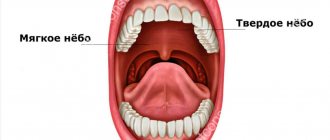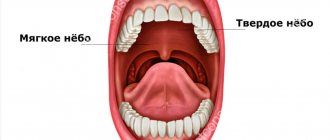Features and symptoms of deviation
In this condition, in addition to loss of sensitivity, the patient often observes a characteristic tingling of the tongue at its tip. Unfortunately, few people immediately consult a doctor, because usually such signs are not regarded as dangerous.
Numbness of the tongue should not be ignored.
In fact, this is a huge mistake, because numbness can easily be the first signal that a serious disease is developing in the body. That is why, when such a symptom appears, a person is recommended to immediately contact a therapist or dentist. If necessary, these specialists will refer the patient to doctors with a narrower medical focus.
Loss of sensuality in this organ can be observed in its different areas (at the tip, one of the sides or the body of the tongue). In many ways, an accurate determination of the affected area will help to correctly diagnose the reasons for the numbness of the palate and tongue.
Most common reasons
The following are the most common causes of numbness of the tongue in humans:
- The development of a side effect after taking potent medications. These can be antipsychotics, antidepressants, antibiotics and other drugs. At the same time, such a condition can also be provoked by the patient’s individual intolerance to the active substances of the drug, combining it with alcohol, or taking it in the wrong dosage.
- Thinning of the mucous membrane in the oral cavity, which may be associated with serious hormonal imbalances or purely physiological changes in the human body.
- The period of menopause in women, which is invariably accompanied by a number of unpleasant changes, including hormonal ones.
- The impact of severe chronic illnesses such as diabetes, Lyme disease or syphilis.
- An advanced form of anemia occurs in a person.
- Development of serious depressive states or neurosis. Stress or severe psycho-emotional stress can also contribute to the development of this symptom.
In many ways, an accurate determination of the affected area will help to correctly diagnose the causes.
Important! When diagnosing the cause of such a condition, the doctor must find out whether such manifestations in the patient are isolated or whether they are already occurring in a chronic form.
Causes of the phenomenon
Reasons why the upper palate becomes numb:
- Severe stress;
- Eating food that is too hot, causing a burn to the oral mucosa, which leads to short-term paresthesia;
- Chronic fatigue;
- Poisoning with alcohol or toxic substances;
- Installation of dentures, which can interfere with the functioning of the palate if the procedure is performed incorrectly;
- Injuries, damage to the spinal or cranial nerves;
- Surgery to remove wisdom teeth.
Paresthesia of the palate area is caused by diseases - hypertension, osteochondrosis of the cervical spine, inflammation of the tonsils, damage to the glossopharyngeal nerve.
Causes of organ numbness in different areas
Numbness of the tip of the tongue is possible due to the following reasons :
- Frequent smoking of tobacco cigarettes. In this case, a person’s taste buds are severely irritated, and the mucous membrane of the organ is affected.
- Taking strong drugs, as well as regular consumption of alcoholic beverages. At the same time, impaired sensitivity of the tip of the tongue is usually provoked by various neurotic disorders in the body.
- Pregnancy period. According to the observations of doctors, a similar condition can be observed in women after the third month of bearing a child. This symptom is caused by a lack of vitamin B12. If you consult a doctor in a timely manner and start taking vitamin complexes, you can successfully get rid of this symptom.
- Poisoning of the body with various heavy chemical compounds.
- The period of the patient undergoing radiation therapy for oncological pathologies.
- Vitamin deficiency or vice versa, hypervitaminosis of certain substances in the body.
Stress can cause tongue numbness.
Frequent disturbances in the sensitivity of not only the tongue, but also the lips usually indicate the development of a number of health problems in a person. This may be due to vascular diseases, mechanical damage or disruption of the nerve connections in this part of the face.
Additional reasons for this condition may be:
- Hypoglycemia.
- Oncological pathologies.
- Various dental problems in the oral cavity, including inflammation of the facial nerve, etc.
- Previously suffered a stroke.
- Lack of nutrients.
Loss of sensitivity at the root of this organ indicates that the person has had severe trauma to the pharyngeal nerve.
Additional Possible Causes
The following additional reasons for the development of this type of paresthesia are identified:
- The effect of anesthesia, especially local anesthesia, which is often used by dentists to numb a person. Usually this condition is not dangerous. Sensitivity returns on its own within a few hours.
- Paresthesia accompanied by numbness in the hands usually indicates a migraine attack. In this case, the patient requires examination by a neurologist.
- Paresthesia of the tongue and throat can be observed with throat diseases such as acute respiratory viral infections and tonsillitis.
- Headaches and numbness of the tongue occur with the development of osteochondrosis. This is usually observed in those people who work at the computer for a long time.
- Dizziness with such paresthesia may indicate the development of a heart attack.
- Vomiting with this symptom occurs during a panic attack and an attack of VSD.
- Dry mouth with impaired sensitivity in the oral cavity can be observed in various diseases. Typically, this symptom develops with diabetes mellitus, infectious lesions and vitamin deficiency.
- Numbness of the tongue after eating may indicate the development of an allergic reaction to certain foods.
- Bitterness in the mouth with a similar symptom occurs due to taking medications.
Numbness of the palate and tongue
Simultaneous numbness of the upper palate with the tip of the tongue occurs when:
- An allergic reaction to a certain component of a medicine, mouth rinse, toothpaste;
- Deficiency of vitamin B and iron in the body;
- Low blood sugar levels;
- Poisoning with chemicals;
- Difficult diabetes mellitus. Lips undergo paresthesia;
- Damage to brain structures or stroke;
- Multiple sclerosis;
- Diseases of the thyroid gland (hypothyroidism);
- Brain aneurysm.
The mucous membranes of the tongue and the entire mouth may swell and lose sensitivity due to disturbances in the functioning of the vegetative-vascular and nervous systems.
Doctor's advice
If this type of paresthesia is observed frequently, the patient should consult a doctor. If necessary, a specialist may prescribe the following studies:
- Ultrasound.
- MRI.
- Blood tests.
- Research of neuroimpulses in the brain.
Treatment tactics depend on the underlying cause.
Treatment for this condition largely depends on the specific cause that caused it. Thus, with cervical osteochondrosis, massage and physical therapy are recommended for the patient. For VSD, vitamin complexes and minerals are prescribed.
If the cause of the illness is depression, then the person is prescribed sedatives or antidepressants. If the symptom is caused by a stroke or oncology, then the person requires urgent hospitalization and selection of the correct treatment. For diseases of blood vessels or nerves, drug therapy is prescribed.
How to deal with facial numbness syndrome due to osteochondrosis
Osteochondrosis of the neck leads to irreversible changes in the vertebrae, which directly affect the general well-being of the patient and may manifest themselves in the form of symptoms that are similar to other pathologies. If discomfort occurs in the upper spine, or disruption of the normal movement of blood and lymph in the tissues of the head and face, it is necessary to conduct a comprehensive examination.
Why does the face go numb with osteochondrosis?
Unpleasant sensations, pain in the back and neck may indicate the development of osteochondrosis, which is formed due to the load on the vertebrae when the spine is in an uncomfortable, static-vertical position for a long time.
If there is damage to the vertebrae, cartilage and ligaments in the cervical region, then disturbances in the sensitivity of the skin of the face may occur, the normal mechanism of blood circulation may change, resulting in increased swelling. These symptoms appear due to changes that occur in bone cells during the development of the disease. Osteochondrosis is characterized by a decrease in the normal thickness of cartilage tissue, which leads to contact and friction of adjacent vertebrae. This can subsequently cause the development of inflammation, pinching of blood vessels, spinal cord nerves, and arteries.
These changes in the circulatory and nervous system of the body affect not only the normal functioning of the spine, but also respond with a burning sensation, numbness of the facial muscles, changes in tissue structure, and symmetry.
Diagnostic examination for osteochondrosis
The dangerous fact is that numbness and a burning sensation in the facial muscles can symbolize the spread of other diseases, for example, the brain, so if unpleasant symptoms occur, it is necessary to conduct a neurological examination.
Headaches and migraines, impaired facial symmetry, numbness, burning, tingling sensation, decreased muscle mobility can be manifestations of impaired blood flow in the brain, the development of tumor growths under the cranial bone, hemorrhage, and stroke. The difference is that in the presence of these symptoms of osteochondrosis, unpleasant manifestations on the face can go away when performing physical activity or, on the contrary, occur when staying in a certain body position for a long time. Also, with diseases of the spine, there is no disruption of mental functions or changes in mental activity, the patient maintains concentration, attention and clarity of thought.
Unfortunately, diagnosing and treating numbness of the facial muscles at home can lead to the progression of the disease. Therefore, it is especially important to conduct an X-ray and tomographic examination of the brain and spinal cord. This will reduce the likelihood of an incorrect diagnosis and help avoid many problems and complications by starting treatment on time.
Treatment of numbness of the facial muscles with osteochondrosis
The fight against the negative consequences of osteochondrosis of the cervical spine is carried out by a neurologist or vertebrologist, who are specialists in the field of diseases associated with the nervous system. As a rule, medications are prescribed after a comprehensive diagnosis, taking into account the individual characteristics of the course of the disease.
To combat disorders in muscle tissue and nerve endings on the face, it is first necessary to begin treatment for osteochondrosis:
- With the help of medications that reduce inflammation in the vertebrae and nearby tissues;
- Rubbing with ointments and creams that reduce pain;
- Medicines that restore the cartilage layer and strengthen joints.
An effective remedy is also a back and neck massage, which improves blood circulation and lymph flow to the brain, saturating and nourishing muscle cells on the face.
Author: K.M.N., Academician of the Russian Academy of Medical Sciences M.A. Bobyr










